It was an unspeakable plan. It was a psychological attack. People were just living their little lives, being kind to their neighbors, driving to soccer practice. They didn’t see it coming. They were an easy target.
They killed Kristi’s mom.
They killed moms and dads and loved ones everywhere.
They were easy targets.
It was an attack.
It was predatory.
Most stories will never be told.
Kristi is making sure her mom’s story is told.
I’d like to do my bit to make sure that happens.
I am sorry for your loss Kristi.
With thanks to Kristi Yapp.
My name is Kristi Yapp. I am not a doctor or a scientist or an investigative Journalist. I am a mom, a daughter, an artist and a storyteller. I have a very important story to tell. It is about my mom, and it is about humanity.
In March 2020, the world changed. We were told that we had an invisible enemy. We were told that there was a deadly virus floating through the air. We were told to hide in our homes and cover our faces.
Then, we were sold a solution. We were sold a lie. Pharmaceutical companies like Pfizer and Moderna had manufactured a vaccine. We were told that, through the magic of science, life could go back to normal again.
People lined up for the injections.
In 2022, after four Pfizer injections, my very healthy mom was suddenly diagnosed with stage-IV pancreatic cancer in her left inguinal groin lymph node, B-cell lymphoma and melanoma. Her immune system had failed completely. She lived, suffering, until December 13.
I was her full-time caretaker.
In 2023, day by day, using memories, photos, text conversations, medical records, my journal, and my mom’s journal, I chronicled the story of her disease on Facebook. I told about her illness, the failed medical response, her experience, my experience and how a community and faith in God got us through.
I have started the process of editing and rewriting on Substack. I am currently editing and updating my original Facebook posts. As I am writing, I am finding the answers to some of my original questions.
Can you share a bit about your mother's life and personality before her illness? What were some of her passions and daily joys?
On June 11, 2022, my mom was healthy. In fact, she was addicted to her healthy lifestyle.
My mom’s motto was “I cannot control much in life, but I can control what I put into my mouth.”
When my mom was in her thirties, like many Americans, she was overweight. She got to the point where she felt sick and tired all of the time. She decided to make a change. In 1987 my mom lost over one hundred pounds. For the following thirty-six years, she made sure she never gained it back.
My mom measured and tracked every single thing that she ate. Her diet consisted of lean meats, organic fruits and vegetables, healthy oils and nuts. In addition, each day, she allowed herself two cups of coffee with milk. Before bed, for dessert, she would eat plain Greek yogurt with fresh blueberries on top. She drank water throughout the day, and, on occasion, drank a glass of red wine.
My mom did not touch sugar or processed food.
My mom was also very active. She went to the gym every day and took a water aerobics class. She swam laps. She took walks. She worked in her garden. She volunteered at the food pantry, where she spent hours filling paper grocery bags with canned goods.
My mom wore a pedometer to track her daily steps. She would park as far as possible from her destination so that she would improve her step count. She would march in place while she washed dishes and cooked. She would walk in circles around her living room while she was waiting for her laundry to dry.
My mom never stopped moving. She never sat still. She never gave up.
For many people in our community who wanted to get healthy, my mom was an inspiration.
What were the first signs or symptoms that something was amiss with your mother's health? How did you both initially react to these changes?
On June 12, 2022, at approximately 7:00 AM, I received a text from my mom:
My mom was a person who never complained and never asked for help- so I knew when I got those texts that something must be very wrong. I had such an apprehensive feeling.
However, the emergency room doctors decided right away that the problem was constipation. The hospital staff had a flippant attitude.
Doctors, nurses and receptionists kept lecturing my mom on the importance of fiber. I kept explaining that my mom had eaten nothing but fiber for the past 20 years.
After some preliminary scans, the doctor’s noticed some swelling around the pancreatic and bile ducts. This led to more testing, and my mom ended up staying in the hospital for five days.
A pancreatic endoscopy was performed, fortunately it came back clear. The swollen ducts had caused the doctors to be concerned about pancreatic cancer. Luckily, they were able to rule it out.
While she was there, the lump in her groin was visibly growing larger each day. The doctors said it was likely a herniated muscle that would heal with rest.
When she was released from her first hospital stay, she was given a diagnosis of constipation and a hernia.
Describe the moment when you realized that your mother's condition was serious. How did this realization impact you and your family?
My mom left the hospital on June 17, 2022, with a large, painful lump in her groin, but, an otherwise clean bill of health. She was told to go home and rest. She was told to take Motrin for the pain.
On June 19, results of a tumor marker blood test were in. The test had been looking for signs of pancreatic tumor growth. A number under three-hundred-seventy is a normal result. My mom’s number was over five thousand.
In addition, the lump in her groin had continued to grow. Her pain was becoming more and more unmanageable.
By June 20, my mom could no longer stand up straight. She was walking with a pronounced limp and had to hold onto furniture to get around the room.
On June 22, my mom asked me to come over and help her with housework. This was significant because my mom prided herself on her independence. She did all of her own housework, yard work, and home repairs. She had never asked me for help before.
By June 24, 2022, my mom was no longer able to walk. She was completely debilitated and wheelchair bound. The intense pain was paralyzing. She needed help with every aspect of her life, including feeding herself, combing her hair and using the bathroom.
It had been twelve days since I took my mom to the hospital for a small, painful lump in her groin. Suddenly, my mom needed somebody to take care of her, twenty-four hours a day.
I looked at my mom and knew that I was meant to be the person who would care for her. I prayed that God would watch over my husband, my boys and my dogs, and I then quit my job and became my mom’s full-time caregiver.
Our entire world changed.
Can you walk us through the diagnosis process? What were the challenges you faced in getting a clear understanding of your mother's condition?
It took over twenty-seven days for my mom to be diagnosed with stage IV metastatic pancreatic cancer. Upon diagnosis, cancer had spread throughout her lymphatic system, but that same cancer had been undetectable just twenty-seven days earlier.
Here are the diagnostic highlights of that twenty-seven day period:
On June 12, 2022 I took my mom to the emergency room. She had been constipated, and had discovered a small, painful lump in her groin.
On June 12, the emergency room doctors ordered a scan of my mom’s abdomen. They noticed swelling of the pancreatic and bile ducts, making them concerned about the possibility of pancreatic cancer.
On June 13, a pancreatic endoscopy was performed in the hospital. My mom was anethetized, and a small camera was led through her esophagus and into her pancreas. The doctor looked at the pancreas and collected a sample for biopsy. The doctor did not see any cancerous growth in my mom’s pancreas. The endoscopy ruled out pancreatic cancer.
On June 17, my mom was released from the hospital with a diagnosis of constipation and a hernia.
On June 19,the result of a tumor marker blood test came back. It indicated large amounts of pancreatic tumor growth. The doctor said that the result was impossible based on the endoscopy result. We were still waiting for the result of the biopsy.
On June 23 we found out that the biopsy had not been performed. The doctor decided to repeat the tumor marker blood test.
On June 28, my mom got a full body PET scan.
On June 29, my mom got an ultrasound of her leg and a large blood clot was found.
On June 30, the result of the second tumor marker blood test came back. The number had increased from five-thousand to five-thousand-seven-hundred.
On July 1, the PET scan results came back. It said that the doctors were “concerned about a pancreatic malignancy.”
On July 6, a surgeon removed the enlarged lymph node that had been causing so much pain in my mom’s groin. He sent the lymph node for biopsy.
On July 8, my mom received a diagnosis. She had stage IV metastatic pancreatic cancer that had spread throughout her lymphatic system. She also had B-cell lymphoma and melanoma.
Your mother was diagnosed with multiple cancers at an unprecedented rate, a condition you referred to as "Turbo Cancer." How did the Covid-19 vaccine factor into your mother's health narrative? What led you to believe there was a connection between the vaccine and her immune system's response?
On July 8, biopsy results came back, showing my mom had pancreatic cancer cells, and B-cell lymphoma cells, growing in the left inguinal lymph node, that had been removed and biopsied. Because she had had several carcinomas removed in May, it was determined that she was suffering from three types of cancer, simultaneously.
On June 13, doctors told us, with absolute certainty, that it was impossible for pancreatic cancer to be found in the left inguinal lymph node, when it was not present in the pancreas.
If the doctors were correct, my mom was free of pancreatic cancer on June 13, meaning it had progressed from stage 0 to stage IV over the course of twenty-five days. The only other explanation was that the impossible had occurred, and my mom had aggressive pancreatic cancer cells growing where, according to the doctors, they could not grow.
When my mom got sick, I had already spent a lot of time researching the Covid-19 vaccine. In 2020, I was one of the millions of people whose job was threatened by mandates. In the end, I decided not to take the vaccine, and I was fired from my job of fifteen years.
Making the decision to risk my job was not one that I took lightly. I did an incredible amount of research on the subject. I read scientific papers and watched videos from people like Dr. Robert Malone, Dr. Peter McCullough and Dr. Zev Zelenko. What they were saying made sense to me. What the media was saying did not.
These men, and others, predicted a rise in heart disease and cancer. They warned about immune system failure. The information was all available, people just refused to look at it.
Based on everything that I had read, I expected my mom to get sick. I wanted to be wrong. I would have preferred that it be me that chose the wrong side. It would have been easier for me if I had been the one to suffer.
However, I had a feeling in the pit of my stomach. I knew something was wrong about the vaccine program, and I knew that my mom was going to get hurt.
I tried to tell her. I tried to warn her. However, the voice of the propaganda machine was louder than my own.
When she got sick, Dr. Ryan Cole was releasing information about what he had termed “turbo cancer.” While the articles I was reading, at that time, referred mostly to breast cancer, the similarities were undeniable. It was obvious that what Ryan Cole was describing was happening to my mom.
I became obsessed with understanding. I watched and read every available piece of information on MRNA, Covid-19 vaccines, side effects, pancreatic cancer and turbo cancer. I learned a lot.
This is July 8, 2022, the day that we received a diagnosis:
This was not normal cancer.
My mom had multiple cancers simultaneously, along with aggressive tumor growth.
My mom had turbo cancer.
I had never heard of Turbo Cancer before - it didn’t sound like a real thing to me. For me, until this day, last year, turbo cancer hadn’t existed.
I know a lot about it now.
Turbo Cancer isn’t actually a cancer problem at all - it is an immune system problem.
Each of us is born with an immune system. The immune system has only one job - to fight off invaders. These invaders can come in many forms - bacteria, viruses, parasites, or mutated cells.
As part of our immune system, we each have killer-T cells.
Our bodies are made up of cells - and these cells constantly divide and replicate into exact copies of themselves. These copies, however, are sometimes damaged or mutated.
It is the job of the killer-T cells to destroy all mutated cells. If a mutated cell is allowed to survive, it will multiply into more mutated cells. Then those cells will start multiplying, causing a dense mass called a tumor. When mutated cells multiply, you have cancer.
With a strong immune system, the body detects mutated cells and sends out killer-Ts. The killer-T cells destroy the mutated cells and cancer is not allowed to grow.
With a weakened immune system - the body detects most mutated cells and send the killer-Ts, however, sometimes an individual mutated cell may escape detection and begin to divide and replicate. That is how tumor growth begins.
With no immune system- every bacterium, virus, parasite or mutated cell is allowed to grow, unchecked. The body is left defenseless.
When there is no immune system, multiple cancers can grow and reach stage IV at an accelerated rate.
When there is no immune system - there is Turbo Cancer.
The Covid-19 vaccine had destroyed my mom’s immune system. It had left her defenseless.
My mom had been healthy for seventy-five years. Suddenly, she had every disease, all at once. Her immune system had been shut down. Her killer-T cells were no longer coming out to fight. Her tiny army had surrendered.
The concept of "Turbo Cancer" suggests a rapid and aggressive progression. How did this diagnosis change the approach to your mother's care and treatment?
Actually, the oncologist approached my mom’s cancer as if it had been typical. The first time we went to see her, she told us that people with my mom’s diagnosis can live up to five comfortable, satisfying years. She had no sense of urgency.
We told her how active my mom had been, weeks before. We pointed out her debilitation. We described her pain.
There is a term for the attitude of the oncologist, it is ‘willful blindness.’ My mom went to the office for her treatments and tests. The doctor would check the results on her computer screen. She would say that the numbers were improving. She would say that progress was being made.
The computer screen and my mom’s physical condition were telling two very different stories. There was a period of time when it seemed as if my mom’s condition might improve. There were some days when the pain lessened, and my mom could move again. However, it didn’t last long. My mom’s groin never healed, her edema never healed, and her pain was never effectively managed.
Most of the time, it seemed as if the doctors were experimenting on my mom. They never admitted to understanding why her body had lost its ability to fight disease. They simply formed theories and tested a variety of hypotheses. All of their tests failed.
You took on the role of caregiver for your mother during her illness. Can you describe the emotional and physical toll this took on you?
In my book, on July 2, I describe the moment at which I realized that my mom needed absolute care. It was the moment when I saw her actual pain, as well as what that pain was doing to her.
Pain is hard to look at. As human beings, our natural instinct is to look away. In order to care for my mom with the intensity that was required, I had to be able to face reality. I had to accept the fact that my mom had been attacked by something unnatural. I knew that this was an effect of the vaccine. My mom’s suffering forced me to see that the vaccine was a weapon. My mom had been attacked, and we had been put on a collision course with terminal illness, the medical system and the acceptance of death.
When I became my mom’s caregiver, it was as if my brain had shut down. I acted on instinct alone. Life had devolved into chaos. I understood that we were in the middle of a war, but my mom was dying, and she deserved to die in peace. All I could do was try to keep her as comfortable as possible, at the end of the world.
Here is the excerpt from my book. This is June 2, 2022:
Lying there, she closed her eyes and, for a moment, her tense forehead smoothed.
She reached her two hands up and forward, as if she had been holding a basketball.
She said: “This pain - I just don’t know where to put it anymore.”
And I could see it.
In her hands, there was a metallic, translucent sphere filled with neurons and electricity and fire.
Her pain wasn’t a concept. It wasn’t a description of a feeling. Her pain was a real, living, breathing being that was there in that room, with us.
It was a demon that had dug in with its talons and taken up residence - and it did not intend to leave.
I saw that thing.
And I prayed.
I asked God to take care of my husband and my boys and my dogs for me, as I had a mission to complete.
I prayed for strength and I prayed for humility.
I repeated that prayer so many times. Sometimes every day. Sometimes every hour. Sometimes every minute.
Sometimes those were the only words that could be found inside of my head.
“Strength and humility. Strength and humility. Strength and humility.”
My mom, who had always taken care of everyone, was now completely vulnerable and dependent. She was like an infant - in need of the gentle, loving, compassionate care.
I knew that somebody had to take care of her.
I knew that it was always supposed to be me.
Throughout her illness, what were some of the significant hurdles you encountered within the healthcare system, and how did you navigate them?
There were so many hurdles in trying to navigate the healthcare system that I had to write a whole book about it. It would be easier to tell you about times when things went smoothly.
Many pages of my book talk about issues we encountered within the system. However, I keep going back to one important point.
My mom was tortured with turbo cancer for six months. For all of her tests, treatments and hospital stays, her insurance was charged over one million dollars.
Over a period of six months, the system made over one million dollars, as a result of my mom’s suffering. But they couldn’t provide tape that didn’t burn her skin?
The medical system makes obscene amounts of money as a result of pain and suffering. In exchange, they offer a confusing maze. Sick people, in need of gentle care and guidance, are easily lost and forgotten.
The darkest part is that they not only profit as a result of pain and suffering, they cause the pain, suffering and death.
And they give nothing in return.
Considering the amount of money the system made from my mom, she should have been treated like royalty. However, it was hard to find compassion within that labyrinth. We were made to sit, and wait, helplessly, for presumed pain-relieving treatments. While we waited, we were treated as if we hadn’t existed:
The oncology lab would have to do a new blood test, and we would have to wait for one hour until the results came in. After that, my mom could start her chemo treatment.
With promises of pain relief and prolonged life, there seemed to be no other option. We had to wait.
We went to the oncology lab. The technician drew my mom’s blood. We went to the chemotherapy room, and we waited.
And we waited, and waited, and waited.
After an hour, the blood test results were in. My mom was cleared for chemo.
I would like to say that this started chemo right away - but it didn’t.
Chemo drugs are unstable once mixed, and they are expensive. It is very important to the system that money not be wasted. Therefore, the pharmacist never mixes the drugs until the patient is in the chair and cleared for treatment.
The University of Chicago South Suburban Medical Group, at that time, had only one pharmacist preparing drugs for patients at three separate locations. The pharmacist would prepare the drugs off-site, and then a courier would deliver the drugs to the three locations.
We had to wait for the poison to arrive.
Chemotherapy promised pain relief and prolonged life. So, we waited.
And we waited, and waited, and waited.
Chemo chairs should be the most comfortable chairs in the world, but they are not. The chair was hard and flat. My mom asked the nurses if she could have some pillows and blankets. She told them that she was uncomfortable.
They should have offered pillows and blankets without being asked. Offering pillows and blankets is not only their job, it is an expression of concern for the vulnerable and for the suffering. Our innate desire to care for and protect the innocent and the weak is what separates us from the animals. Recognizing, and caring about, the needs of others, is what makes us human.
When my mom had trained to be an oncology nurse, she had been taught that the comfort of the patient was as important as the treatment itself.
Hours passed. My mom and I sat in the room, listening to the staff complain about their jobs. I was actually impressed by their ability to complain, non-stop, for five hours.
I wonder if they realize their absurdity. They complain about the trivialities of their lives, while they administer poison to dying, suffering human beings. There is something about it that makes it laughable.
The experience did not inspire trust. Or hope.
We had waited forty-five minutes for the staff to find my mom in the computer. We had waited one hour for the blood test results. We had waited an additional two hours for the chemo drugs to arrive. Finally, my mom received her two-hour chemotherapy infusion. By the time it was done, we were both feeling exhausted and discouraged.
Your story mentions moments of frustration and helplessness, particularly in interactions with healthcare professionals. Can you share an instance that was particularly challenging, and how you addressed it?
Dealing with my mom’s illness and dealing with the medical system left me feeling helpless and powerless - most of the time. The sense of helplessness was a direct result of regulations and policies, imposed by boards of directors and CEOs.
The doctors, nurses, office managers, pharmacists, receptionists, janitors and couriers are just as powerless as the patients. There is no effective person who can hear complaints and inspire change. That person does not exist. There is nobody to talk to. There is no help to be found. The policies leave no room for humanity.
Which is the whole point, of course. The point is to strip us of our humanity:
Finally, when it was my turn, I explained that I had filled a partial prescription the day before, and was back for the rest of the pills. The pharmacist listened to my story, and then he said: “No.”
He told me that, when I accepted seven pills the day before, I had forfeited my rights to the remaining twenty-three. He said that my mom’s prescription was now void.
I was unable to comprehend what he was saying to me. I couldn’t wrap my head around it.
My mom had pain that had changed her completely, overnight.
My mom had a lump in her groin, that was doubling in size daily.
We still didn’t have a diagnosis.
We still didn’t have a treatment plan.
We still didn’t have a strategy.
My mom was suffering.
And there was no access to relief.
And the system didn’t care.
I fell apart. At fifty years old, I found myself, standing in a Walgreens, crying, begging a man in a white coat to show mercy.
I asked him to break protocol - to help ease the suffering of a fellow human being.
I told him about my mom and her strange lump and her debilitating pain.
I told him that, in that moment, he was the only person on Earth who could help her.
I cried and I begged and I pleaded.
He shrugged his shoulders, turned his back on me, and walked away.
I couldn’t believe it.
The western medical system is void of humanity.
Despite the hardships, were there moments of hope or positivity that you and your mother experienced during her illness? Can you share a memorable one?
Being able to support my mom through her disease and death was as powerful an experience as giving birth and raising young children. It was, in many ways, a very similar experience. My mom became absolutely dependent on me, very suddenly. I knew, instinctively, as a mother, that she needed to be cared for and protected.
My mom became emotionally raw and vulnerable. This occurred as a combination of dependence, debilitation, pain and narcotics. Because my mom was so open, and because her spirit was moving away from this world, there were things that she said that amazed me. It was as if she had been my child, saying words and sentences for the first time.
The spirit is close to heaven at the beginning of life and at its end.
There were things that my mom said or did that brought me immense joy. It was mostly small jokes or gestures. However, knowing that my mom was dying made those small jokes feel incredibly significant:
On this day, my boys were there, visiting with mama. We decided to play The Word Association Game. To play, a topic is chosen, and then players have to take turns, quickly saying words associated with that topic. When a player either repeats a word or goes five seconds without saying a word - they are out.
It was Mama versus Marko and the topic was dog breeds:
Mama: Husky
Marko: Pitt bull
Mama: Maltese
Marko: Doberman
Mama: Chihuahua
Marko: Labradoodle
Mama: Husky
And there it was. My mom had said husky twice. Marko was patting himself on the back and gloating over his victory: “Ha! You said husky twice! I win!”
My mom, unwilling to accept this loss, replied: “I don’t think so. I have cancer.”
Marko, taken aback, asked: “Does that mean you just win every game from now on?”
And my mom, her head held high, and defiance etched across her face, responded with a simple, but strong: “Yes.”
The challenge was there - and, for a few long seconds, they were staring each other down.
Then a tiny smile appeared on my mom’s face, and the entire room exploded with laughter.
The earth and the heavens exploded with laughter.
Your mother's story is not just about her illness but also about systemic issues within healthcare and societal responses to disease and treatment. What are the key messages you hope to convey about these broader issues?
My mom was tortured with turbo cancer for six months. For all of her tests, treatments and hospital stays, her insurance was charged over one million dollars.
Over a period of six months, the system made over one million dollars as a result of my mom’s suffering. But they couldn’t provide tape that didn’t burn her skin?
They don’t care about us, at all. I think that is important to understand. It is important to remember.
The most important message I have is that the system does not care about us. There are no individual doctors or nurses or office managers who are to blame for this. They are slaves to the policies and mandates that are set by billionaire CEOs.
We can’t count on the system to care for us or to save us. We need to care for and save ourselves. The way I see it, the only path to health is through a reconnection to nature. Everything we need to survive is provided for us. We each need to take responsibility for our own health.
How has your mother's journey impacted your views on health, treatment options, and the medical community at large?
Since my mom got sick, I have developed an obsession with foraging and learning about medicinal plants and foods. I believe that we need to reject the medical establishment entirely and learn the things that our ancestors knew. The medicines we need are growing, freely, from the earth. It has been provided for us. We have the right to understand and use the gifts that God has given us.
I hope never again to need to patronize a western doctor or hospital. I do not trust them. They profit from our pain and suffering and, therefore, do not encourage health.
My recommendation is to add natural, healthy practices to your lifestyle. Avoid the western medical system at all cost.
In reflecting on your mother's story, what are the main lessons or insights you've gained that you wish to share with others going through similar experiences?
Don’t be afraid to care for a person whom you love. It is not an experience that we are all blessed with. I feel so lucky to have had this experience with my mom.
It was the hardest thing I have ever done in my life, but also the most rewarding. The profound love that I felt toward my mom is impossible to describe. Seeing her overcome her pain and strengthen her relationship with God was inspirational.
Our enemy thought that they could sever our ties with God through this spiritual attack. They thought that we would become angry at God for allowing such widespread human suffering.
They were wrong.
God could not take my mother’s suffering away - it was predetermined. He could, however, send angels to help her along the way.
My mom’s suffering brought out the angel in me. It forced me to look at the truth. It strengthened my spirit. It awoke my desire to protect innocence and light.
The next few years are going to be hard. More people are going to get sick. More people are going to die.
Never let the darkness separate you from God.
Finally, how do you hope your mother will be remembered, and what steps are you taking to honor her legacy and share her story with a wider audience?
My mother was not a perfect person, but she tried really hard to be good. My mom was an oncology nurse and then a hospice nurse. After retirement, she volunteered at the food pantry and at the homeless shelter. Additionally, whenever anyone in our community was sick, my mom would make a house-call, ensuring that they receive the best possible care.
My mom had worked in the system. She believed in the system. She trusted the system.
When she needed the system, it deserted her.
To them, she was less than human.
She was expendable.
My mom was a victim of an attack. The weapon was an injection.
She didn’t deserve it. She didn’t commit a crime.
She was simply too nice. Too easy-going. Too compliant.
She was too good to look upon evil.
That was her flaw.
She was one of millions. One of millions of people who were too nice, easy-going, and compliant.
They didn’t deserve it.
We cannot allow them to be forgotten.
I started writing this book because my mom’s story wants to be told. Sadly, hers is a story shared by millions.
It is strange to say, but I received many gifts from my mom’s disease. God granted me strength that I had not known existed. I received my mom’s boundless love for humanity. I witnessed the truth about what was done to us.
About what is being done to us.
And I received my mom’s story.
Maybe she gave me her story for it to be told. Maybe it was her last-ditch effort to save humanity.
Maybe it was her last-ditch effort to save us from ourselves.
That was all that she had ever tried to do - save us from ourselves.
I think that, as she got older, and as the world started falling apart, it became too much. My mom loved every person. However, the propaganda became too strong. Kind-heated people were falsely convinced that love and acceptance of abuse are the same thing. Somehow, tolerance became self-flagellation. All of the beliefs got twisted, and people got confused.
It was all part of the attack.
Everything that we had believed to be stable started falling apart.
For some, it was too much to look at.
It was too much to see.
It was all part of the attack.
Confuse the people. Frighten the people. Isolate the people. Cover their faces. Make them not people.
Offer them a solution. Offer them an illusion. Claim that it is the answer.
What a dirty trick.
It was an unspeakable plan. It was a psychological attack. People were just living their little lives, being kind to their neighbors, driving to soccer practice. They didn’t see it coming. They were an easy target.
And it is so incredibly sad.
And now we are all grieving.
Because, at the end of the day, these are the people we love.
So, maybe, my mom gave me her story.
For it to be told.
So that we all will see the truth.
To know the whole story, begin on June 11, 2022:
Thank You for Being Part of Our Community
Your presence here is greatly valued. If you've found the content interesting and useful, please consider supporting it through a paid subscription. While all our resources are freely available, your subscription plays a vital role. It helps in covering some of the operational costs and supports the continuation of this independent research and journalism work. Please make full use of our Free Libraries.
Discover Our Free Libraries:
Unbekoming Interview Library: Dive into a world of thought-provoking interviews across a spectrum of fascinating topics.
Unbekoming Book Summary Library: Explore concise summaries of groundbreaking books, distilled for efficient understanding.
Hear From Our Subscribers: Check out the [Subscriber Testimonials] to see the impact of this Substack on our readers.
Share Your Story or Nominate Someone to Interview:
I'm always in search of compelling narratives and insightful individuals to feature. Whether it's personal experiences with the vaccination or other medical interventions, or if you know someone whose story and expertise could enlighten our community, I'd love to hear from you. If you have a story to share, insights to offer, or wish to suggest an interviewee who can add significant value to our discussions, please don't hesitate to get in touch at unbekoming@outlook.com. Your contributions and suggestions are invaluable in enriching our understanding and conversation.
Resources for the Community:
For those affected by COVID vaccine injury, consider the FLCCC Post-Vaccine Treatment as a resource.
Discover 'Baseline Human Health': Watch and share this insightful 21-minute video to understand and appreciate the foundations of health without vaccination.
Books as Tools: Consider recommending 'Official Stories' by Liam Scheff to someone seeking understanding. Start with a “safe” chapter such as Electricity and Shakespeare and they might find their way to vaccination.
Your support, whether through subscriptions, sharing stories, or spreading knowledge, is what keeps this community thriving. Thank you for being an integral part of this journey.

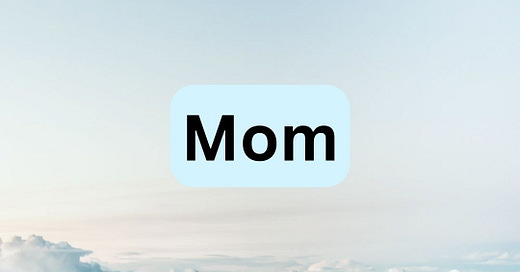



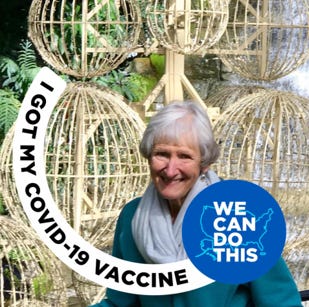
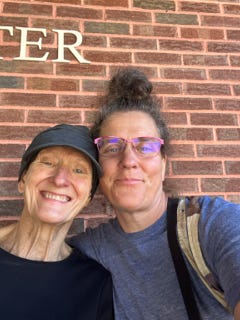
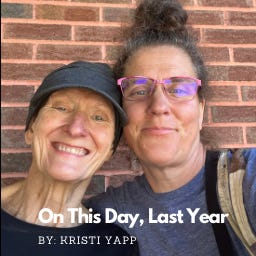
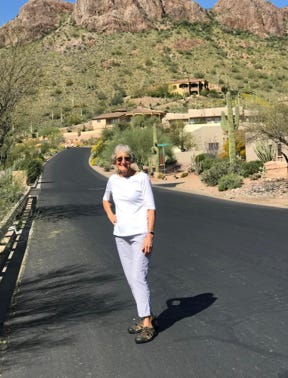
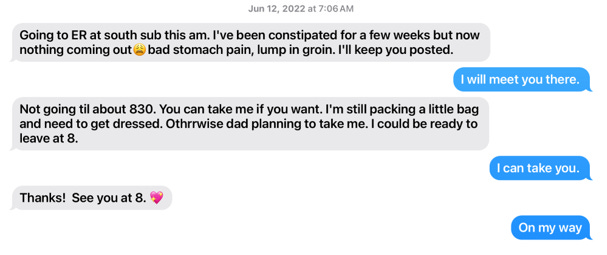
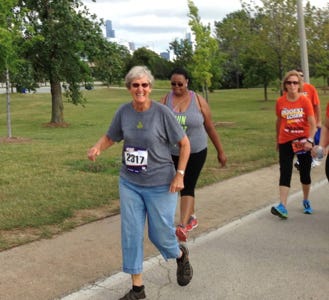
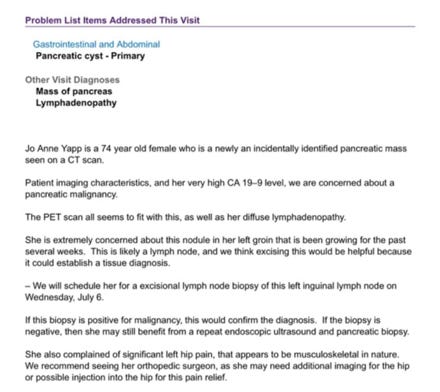
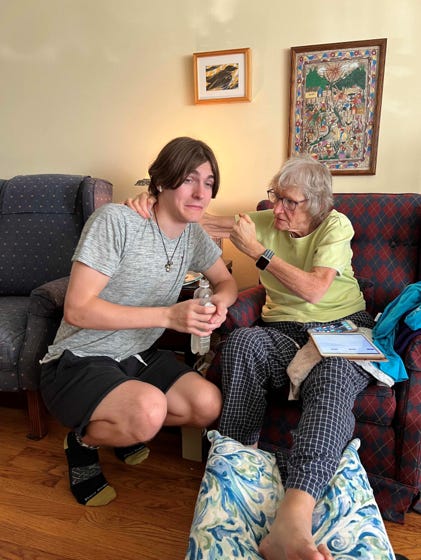
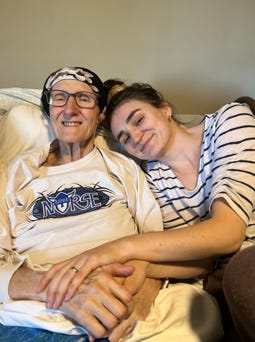

And We want VENGEANCE. My dad took 3 Emergency Authorisation Use mRNA Gene Altering jabs, misnamed a "vaXXine" and THEN he got Convid. He had Premium Health Insurance, had it 50 years, yet overheard the ward doctor tell the nurse "meh, he's old, send him home ". A week later, diagnosed with pancreatic C with 2 months to live... he lived 7 weeks and died badly 😢 😔 💔 I want fucking fair trials and public executions. 😤
Thank you for this - will read with great eagerness. When I stumbled on Kristi's writing entirely by accident I was totally amazed. Her mom's story deserves to be told, and she tells it so well. Her articles move me to tears.